口译与听力-00602-2002
- 格式:doc
- 大小:24.00 KB
- 文档页数:2
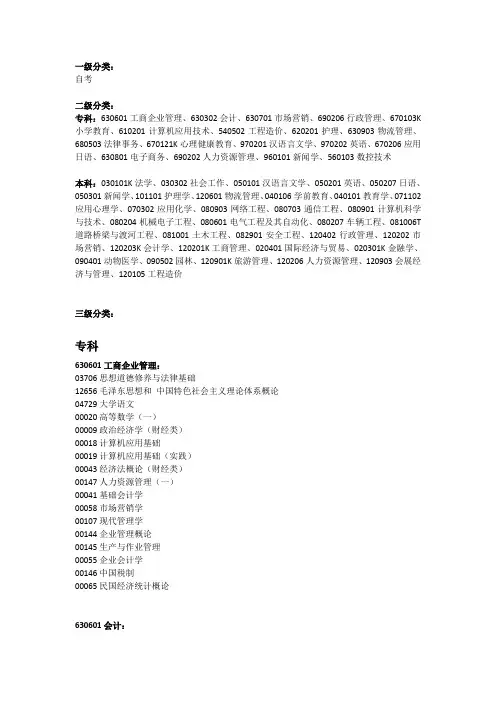
一级分类:自考二级分类:专科:630601工商企业管理、630302会计、630701市场营销、690206行政管理、670103K 小学教育、610201计算机应用技术、540502工程造价、620201护理、630903物流管理、680503法律事务、670121K心理健康教育、970201汉语言文学、970202英语、670206应用日语、630801电子商务、690202人力资源管理、960101新闻学、560103数控技术本科:030101K法学、030302社会工作、050101汉语言文学、050201英语、050207日语、050301新闻学、101101护理学、120601物流管理、040106学前教育、040101教育学、071102应用心理学、070302应用化学、080903网络工程、080703通信工程、080901计算机科学与技术、080204机械电子工程、080601电气工程及其自动化、080207车辆工程、081006T 道路桥梁与渡河工程、081001土木工程、082901安全工程、120402行政管理、120202市场营销、120203K会计学、120201K工商管理、020401国际经济与贸易、020301K金融学、090401动物医学、090502园林、120901K旅游管理、120206人力资源管理、120903会展经济与管理、120105工程造价三级分类:专科630601工商企业管理:03706思想道德修养与法律基础12656毛泽东思想和中国特色社会主义理论体系概论04729大学语文00020高等数学(一)00009政治经济学(财经类)00018计算机应用基础00019计算机应用基础(实践)00043经济法概论(财经类)00147人力资源管理(一)00041基础会计学00058市场营销学00107现代管理学00144企业管理概论00145生产与作业管理00055企业会计学00146中国税制00065民国经济统计概论630601会计:03706思想道德修养与法律基础12656毛泽东思想和中国特色社会主义理论体系概论04729大学语文00020高等数学(一)00009政治经济学(财经类)00018计算机应用基础00019计算机应用基础(实践)00043经济法概论(财经类)00065国民经济统计概论00041基础会计学00155中级财务会计00156成本会计00067财务管理学00157管理会计(一)00146中国税制00144企业管理概论00070政府与事业单位会计630701市场营销学:03706思想道德修养与法律基础12656毛泽东思想和中国特色社会主义理论体系概论04729大学语文00020高等数学(一)00009政治经济学(财经类)00018计算机应用基础00019计算机应用基础(实践)00043经济法概论(财经类)00065国民经济统计概论00041基础会计学00177消费心理学00144企业管理概论00178市场调查与预测00058市场营销学00179谈判与推销技巧04097市场营销策划(一)00181广告学(一)00182公共关系学690206行政管理:03706思想道德修养与法律基础12656毛泽东思想和中国特色社会主义理论体系概论04729大学语文00040法学概论00312政治学概论03350社会研究方法00147人力资源管理(一)00107现代管理学00341公文写作与处理00182公共关系学00163管理心理学00292市政学00277行政管理学00018计算机应用基础00019计算机应用基础(实践)670103K小学教育:03706思想道德修养与法律基础12656毛泽东思想和中国特色社会主义理论体系概论04729大学语文00395科学▪技术▪社会00408小学科学教育00407小学教育心理学00405教育原理00410小学语文教学论00411小学数学教学论00412小学班主任00406小学教育科学研究00018计算机应用基础00019计算机应用基础(实践)00413现代教育技术00414现代教育技术(实践)00012英语(一)00409美育教育00415中外文学作品导读00416汉语基础00417高等数学基础00418数论初步610201计算机应用技术:03706思想道德修养与法律基础12656毛泽东思想和中国特色社会主义理论体系概论00022高等数学(工专)00012英语(一)04729大学语文02198线性代数04730电子技术基础(三)04731电子技术基础(三)(实践)02316计算机应用技术02317计算机应用技术(实践)00342高级语言程序设计(一)00343高级语言程序设计(一)(实践)02142数据结构导论02318计算机组成原理04732微型计算机及接口技术04733微型计算机及接口技术(实践)02323操作系统概论02120数据库及应用02121数据库及应用(实践)02141计算机网络技术04755计算机网络技术(实践)540502工程造价:03706思想道德修养与法律基础12656毛泽东思想和中国特色社会主义理论体系概论00018计算机应用基础00019计算机应用基础(实践)00022高等数学(工专)02409桥梁工程02410桥梁工程(实践)02389建筑材料02390建筑材料(实践)06084公路施工组织与概预算06270技术经济学06279道路工程制图03937道路工程03938道路工程(实践)03940工程造价原理与编制03941工程招标与合同原理03942工程造价案例分析(一)03943工程造价案例分析(一)(实践)07999毕业设计620201护理:03706思想道德修养与法律基础12656毛泽东思想和中国特色社会主义理论体系概论04729大学语文02997护理学基础02864微生物学与免疫学基础03179生物化学(三)03180生物化学(三)(实践)02899生理学02900生理学(实践)02901病理学02902病理学(实践)02903药理学(一)02904药理学(一)(实践)02998内科护理学(一)03001外科护理学(一)02996护理伦理学02113医学心理学00488健康教育学03000营养学03002妇产科护理学(一)03003儿科护理学(一)09963护理临床考核630903物流管理:03706思想道德修养与法律基础12656毛泽东思想和中国特色社会主义理论体系概论05362物流英语00018计算机应用基础00019计算机应用基础(实践)07031物流管理概论07037信息技术与物流管理07038信息技术与物流管理(实践)01001物流案例与实训07802采购管理与库存控制03617采购与供应链案例07032运输与配送07008采购与仓储管理05361物流数学05364物流企业会计05372国际物流导论00144企业管理概论00041基础会计学00089国际贸易680503法律事务:03706思想道德修养与法律基础12656毛泽东思想和中国特色社会主义理论体系概论00243民事诉讼法学00260刑事诉讼法学00242民法学00245刑法学00247国际法04729大学语文05679刑法学00244经济法概论00223中国法制史05677法理学00261行政法学670121K心理健康教育:03706思想道德修养与法律基础12656毛泽东思想和中国特色社会主义理论体系概论04729大学语文00018计算机应用基础00019计算机应用基础(实践)02068人体解刨生理学02069人体解刨生理学(实践)02114发展心理学02109心理测量02113医学心理学02106普通心理学02107心理统计02111教育心理学02047社会心理学(二)02112组织管理心理学00284心理卫生与心理咨询970201汉语言文学:03706思想道德修养与法律基础12656毛泽东思想和中国特色社会主义理论体系概论00532中国古代文学作品选(一)00533中国古代文学作品选(二)00530中国现代文学作品选00534中国当代文学作品选00534外国文学作品选00529文学概论(一)00535现代汉语00506写作(一)00536古代汉语00024普通逻辑00031心理学00429教育学(一)00018计算机应用基础00019计算机应用基础(实践)00012英语(一)970202英语:03706思想道德修养与法律基础12656毛泽东思想和中国特色社会主义理论体系概论04729大学语文00794综合英语(一)00795综合英语(二)00593听力00594口语00595英语阅读(一)00596英语阅读(二)00597英语写作基础00522英语国家概况670206应用日语03706思想道德修养与法律基础12656毛泽东思想和中国特色社会主义理论体系概论04729大学语文00605基础日语(一)00606基础日语(二)00607日语语法00608日本国概况00843日语阅读(一)00844日语阅读(二)00490日语听说06042日语写作06047日语会话630801电子商务03706思想道德修养与法律基础12656毛泽东思想和中国特色社会主义理论体系概论00888电子商务英语00889经济学(二)00041基础会计学00890时长营销(三)00891国际贸易实务(三)00892商务交流(二)00893市场信息学00894计算机与网络技术基础00895计算机与网络技术基础(实践)00896电子商务概论00897电子商务概论(实践)00898互联网软件应用与开发00899互联网软件应用与开发(实践)00900网页设计与制作00901网页设计与制作(实践)00902电子商务案例分析00903电子商务案例分析(实践)00904综合作业00905综合作业(实践)690202人力资源管理:03706思想道德修养与法律基础12656毛泽东思想和中国特色社会主义理论体系概论04729大学语文00020高等数学(一)00009政治经济学(财经类)00018计算机应用基础00019计算机应用基础(实践)00043经济法概论(财经类)00065国民经济统计概论00144企业管理概论00163管理心理学00164劳动法经济学00147人力资源管理(一)00165劳动就业概论00166企业劳动工资管理00071社会保障概论960101新闻学:03706思想道德修养与法律基础12656毛泽东思想和中国特色社会主义理论体系概论04729大学语文00040法学概论00530中国现代文学作品选00657新闻心理学00633新闻学概论00653中国新闻事业史00654新闻采访写作00655报纸编辑00853广告学(二)00656广播新闻与电视新闻00018计算机应用基础00019计算机应用基础(实践)560103数控技术专业:03706思想道德修养与法律基础12656毛泽东思想和中国特色社会主义理论体系概论00018计算机应用基础00019计算机应用基础(实践)04107机械制图(三)01970机械设计基础(二)01971机械设计基础(二)(实践)05508金属材料与热处理02187电工与电子技术02188电工与电子技术(实践)08616公差配合与技术测量08783公差配合与技术测量(实践)04077数控技术04114数控机床01668机床设备电器与PLC控制03395数控机床故障诊断与维护08784数控加工工艺基础08785数控加工工艺基础(实践)04118数控加工编程与操作04119数控加工编程与操作(实践)04117CAD/CAM(实践)本科030101K法学:03708中国近代史纲要03709马克思主义基本原理概论00015英语(二)00262法律文书写作00249国际私法00246国际经济法概论00230合同法00228环境与资源保护法00227公司法00226知识产权法00167劳动法05680婚姻家庭法00263外国法制史00264中国法律思想史00265西方法律思想史05678金融法00233税法00257票据法00258保险法00259公证与律师制度00169房地产法030302社会工作专业:03708中国近代史纲要03709马克思主义基本原理概论00015英语(二)00278社会统计学00279团体社会工作00280西方社会学理论00281社区社会工作00282个案社会工作00283社会行政00284心理卫生与心理咨询00285中国福利思想00286福利经济学00287发展社会学06155现代管理理论与方法06183工资管理00165劳动就业概论050101汉语言文学:03708中国近代史纲要03709马克思主义基本原理概论00015英语(二)00537中国现代文学史00538中国古代文学史(一)00539中国古代文学史(二)00540外国文学史00541语言学概论00037美学00812中国当代作家作品专题研究00819训诂学00321中国文化概论00814中国古代文论选读00815西方文论选读00820汉字学概论050201英语:03708中国近代史纲要03709马克思主义基本原理概论00839第二外语(俄语)00840第二外语(日语)00841第二外语(法语)00842第二外语(德语)00600高级英语00087英语翻译00602口译与听力00603英语写作00604英美文学选读00834英语经贸知识00094外贸函电00836英语科技文选00830现代语言学00831英语语法00832英语词汇学00833外语教学法00837旅游英语选读00838语言与文化050207日语:03708中国近代史纲要03709马克思主义基本原理概论00535现代汉语00601日语翻译00609高级日语(一)00610高级日语(二)00611日语句法篇章法00612日本文学选读00845第二外语(英语)07553日语写作(一)10473口译与听力(日语)10243日语(本科)毕业论文050301新闻学:03708中国近代史纲要03709马克思主义基本原理概论00015英语(二)00658新闻评论写作00659新闻摄影00660外国新闻事业史00661中外新闻作品研究00642传播学概论00182公共关系学00321中国文化概论00312政治学概论00662新闻事业管理00529文学概论(一)00643公关心理学101101护理学:03708中国近代史纲要03709马克思主义基本原理概论00015英语(二)00018计算机应用基础00019计算机应用基础(实践)00182公共关系学03004社区护理学(一)03005护理教育导论03006护理管理学03008护理学研究03009精神障碍护理学03010妇产科护理学(二)03200预防医学(二)03201护理学导论03202内科护理学(二)04436康复护理学03007急救护理学03011儿科护理学(二)120601物流管理03708中国近代史纲要03709马克思主义基本原理概论00009政治经济学(财经类)00015英语(二)07006供应链与物流企业管理03361企业物流07724物流系统工程03365物流运输管理07729仓储技术和库存理论07725物流规划03364供应链物流学01574物流管理软件操作(实践)00043经济法概论(财经类)05374物流企业财务管理00098国际市场营销学00147人力资源管理(一)00151企业经营战略00152组织行为学02628管理经济学04183概率论与数理统计(经管类)04184线性代数(经管类)10294物流管理毕业论文040106学前教育:03708中国近代史纲要03709马克思主义基本原理概论00015英语(二)00385学前卫生学00387幼儿园组织与管理00394幼儿园课程00398学前教育原理00401学前比较教育00402学前教育史00882学前教育心理学03657学前教育研究方法12350儿童发展理论12657幼儿教师教研指导00024普通逻辑00409美育教育00887儿童文学名著导读10224学前教育毕业论文040101教育学:03708中国近代史纲要03709马克思主义基本原理概论00015英语(二)00452教育统计测量00464中外教育简史00465心理卫生与心理辅导00466发展与教育心理学00469教育学原理00467课程与教学论00468德育原理00449教育管理原理00456教育科学研究方式(二)00453教育法学00471认知心理00472比较教育06159教育社会学00451教育经济学00450教育评估和督导071102应用心理学:03708中国近代史纲要03709马克思主义基本原理概论00015英语(二)00031心理学00034社会学概论00465心理卫生与心理辅导01425心理卫生与心理辅导(实践)00466发展与教育心理学00471认知心理00657新闻心理学01424人格与社会心理学01426犯罪心理学05616心理测量与评估05617心理测量与评估(实践)06056心理学史00163管理心理学00177消费心理学00643公关心理学06999毕业论文070302应用化学:03708中国近代史纲要03709马克思主义基本原理概论00015英语(二)10993工程数学(线性代数、概率论与数理统计)02066有机化学(二)02067有机化学(二)(实践)08232有机分析02483工业分析10996工业分析(实践)02484仪器分析(二)08823仪器分析(二)(实践)03047分析法学(二)03048分析化学(二)(实践)08227复杂物分析08228复杂物分析(实践)08230绿色化工08231绿色化工(实践)08306环境分析与监测08307环境分析与监测(实践)11134食品分析与检测11135食品分析与检测(实践)00054管理学原理04884化工技术经济05580环境保护06999毕业论文080903网络工程:03708中国近代史纲要03709马克思主义基本原理概论00015英语(二)00023高等数学(工本)02335网络操作系统02331数据结构04734数据结构(实践)02379计算机网络管理04742通信概论04741计算机网络管理04735数据库系统原理04736数据库系统管理(实践)04747Java语言程序设计(一)04748Java语言程序设计(一)(实践)04749网络工程03142互联网及其应用04750互联网及其应用(实践)04751计算机网络安全07999毕业设计(论文)080703通信工程:03708中国近代史纲要03709马克思主义基本原理概论00015英语(二)00023高等数学(工本)00420物理(工)00421物理(工)(实践)02199复变函数与积分变换02197概率论与数理统计(二)02364数据通信原理02373计算机通信网02374计算机通信网(实践)02194工程经济02356数字信号处理02357数字信号处理(实践)02365计算机软件基础(二)02366计算机软件基础(二)(实践)02363通信工程02367微波技术与天线02326操作系统02327操作系统(实践)080901计算机科学与技术:03708中国近代史纲要03709马克思主义基本原理概论00015英语(二)00023高等数学(工本)02197概率论与数理统计(二)02324离散数学02331数据结构04734数据结构(实践)04735数据库系统原理04736数据库系统原理(实践)02325计算机系统机构02326操作系统02327操作系统(实践)04737C++程序设计04738C++程序设计(实践)04747Java语言程序设计(一)04748Java语言程序设计(一)(实践)02333软件工程02334软件工程(实践)04741计算机网络原理07999毕业设计080204机械电子工程:03708中国近代史纲要03709马克思主义基本原理概论00015英语(二)00420物理(工)00421物理(工)(实践)02199复变函数与积分变换02197概率论与数理统计(二)02243计算机软件基础(一)02244计算机软件基础(一)(实践)02238模拟、数字及电力电子技术02239模拟、数字及电力电子技术(实践)02240机械工程控制基础02202传感器与检测技术02203传感器与检测技术(实践)02241工业用微型计算机02242工业用微型计算机(实践)02194工程经济02200现代设计方法02201现代设计方法(实践)02245机电一体化系统设计02246机电一体化系统设计(实践)02247机电一体化系统设计(设计)080601电气工程及其自动化:03708中国近代史纲要03709马克思主义基本原理概论00015英语(二)00023高等数学(工本)04665模拟电子电路04666模拟电子电路(实践)08236电路原理(一)08237电路原理(一)(实践)02290C++语言设计02294微机控制技术02295微机控制技术(实践)02296控制系统数字仿真02300电力系统基础08703电力系统基础(实践)02308电力电子变流技术02309电力电子变流技术(实践)02587数字电子技术基础01670数字电子技术基础(实践)04072电机及拖动08182自动控制原理(一)08183自动控制原理(一)(实践)08239工业过程与过程控制08240工业过程与过程控制(实践)00054管理学原理04741计算机网络原理02338光纤通信原理11685电气工程与自动化毕业设计080207车辆工程:03708中国近代史纲要03709马克思主义基本原理概论00015英语(二)02199复变函数与积分变换02197概率论与数理统计(二)02609互换性原理与测量技术基础04159互换性原理与测量技术基础(实践)02209机械制造装备设计02210机械制造装备设计(实践)05663CAM/CAAD软件应用05664CAM/CAAD软件应用(实践)05795机械制造工艺05796机械制造工艺(实践)06928汽车试验学04161汽车实验学(实践)06573现代汽车技术02583汽车理论04162工程热力学及内燃机原理04163汽车故障诊断与检测技术06929汽车设计04164汽车设计(实践)07999毕业论文081006T道路桥梁与渡河工程:03708中国近代史纲要03709马克思主义基本原理概论00015英语(二)05500桥梁工程(二)08461桥梁工程(二)(实践)06076结构设计原理06077机构设计原理(实践)06078交通工程(二)06079城市道路06080高速公路06087隧道工程06083公路小桥涵勘测设计06084公路施工组织与概预算00420物理(工)00421物理(工)(实践)02197概率论与数理统计(二)02198线性代数02275计算机基础与程序设计02276计算机基础与程序设计(实践)06082筑路机械及施工06219建筑工程管理与法规12525桥梁检测与加固技术06085公路工程电算06086工程监理0608工程项目管理10230道路与桥梁工程毕业设计081001土木工程:03708中国近代史纲要03709马克思主义基本原理概论00015英语(二)00420物理(工)00421物理(工)(实践)02198线性代数02197概率论与数理统计(二)02275计算机基础与程序设计02276计算机基础与程序设计(实践)02439结构力学(二)02440混凝土结构设计02441混凝土机构设计(实践)02442钢结构02443钢结构(实践)03347流体力学05721流体力学(实践)02404工程地质及土力学02446建筑设备02447建筑经济与企业管理02448建筑结构试验02449建筑结构试验(实践)00170建筑工程定额与预算06086工程监理06087工程项目管理082901安全工程:03708中国近代史纲要03709马克思主义基本原理概论00015英语(二)10993工程数学(线性代数、概率论与数理统计)00420物理(工)00421物理(工)(实践)04143安全系统工程12146安全学原理12148防火与防暴技术12716防火与防暴技术(实践)12149安全评价理论与技术12151安全检测技术00051管理系统中计算机应用00052管理系统中计算机应用(实践)00364危险物品管理03778特种设备安全监察03779特种设备安全监察(实践)04148安全生产事故案例分析04145安全生产法及相关法律知识09187化工安全技术12150安全经济学12153矿山工程安全技术12154建筑工程安全技术12718安全工程毕业论文120402行政管理:03708中国近代史纲要03709马克思主义基本原理概论00015英语(二)00034社会学概论00315当代中国政治制度00316西方政治制度00318公共政策00320领导科学01848公务员制度00319行政组织理论00261行政法学00321中国文化概论00322中国行政史00277行政管理学00312政治学概论00024普通逻辑00067财务管理学00144企业管理概论120202市场营销:03708中国近代史纲要03709马克思主义基本原理概论00015英语(二)04183概率论与数理统计(经管类)04184线性代数(经管类)00051管理系统中计算机应用00052管理系统中计算机应用(实践)00150金融理论与实物00183消费经济学00055企业会计学00098国际市场营销学00184市场营销策划00185商品流通概论00149国际贸易理论与实务00186国际商务谈判120203K会计:03708中国近代史纲要03709马克思主义基本原理概论00015英语(二)04183概率论与数理统计(经管类)04184线性代数(经管类)00051管理系统中计算机应用00052管理系统中计算机应用(实践)00058市场营销学00150金融理论与实务00158资产评估00159高级财务会计00160审计学00161财务报表分析(一)00162会计制度设计00149国际贸易理论与实务120201K工商管理:03708中国近代史纲要03709马克思主义基本原理概论00015英语(二)04183概率论与数理统计(经管类)04184线性代数(经管类)00051管理系统中计算机应用00052管理系统中计算机应用(实践)00150金融理论与实务00149国际贸易理论与实务00054管理学原理00067财务管理学00151企业经营产略00152组织行为学00153质量管理(一)00154企业管理咨询020401国际经济与贸易:03708中国近代史纲要03709马克思主义基本原理概论04183概率论与数理统计(经管类)04184线性代数(经管类)00051管理系统中计算机应用00052管理系统中计算机应用(实践)05844国际商务英语00096外刊经贸知识许啊安度00097外贸英语写作00098国际市场营销学00225国际贸易法00055企业会计学00045企业经济统计学00100国际运输与保险00185商品流通概论00102世界市场行情020301K金融学:03708中国近代史纲要03709马克思主义基本原理概论00015英语(二)04183概率论与数理统计(经管类)04184线性代数(经管类)00051管理系统中计算机应用00052管理系统中计算机应用(实践)00058市场营销学07250投资学原理00054管理学原理00067财务管理学00076国际金融04762金融学概论00078银行会计学00079保险学原理090401动物医学:03708中国近代史纲要03709马克思主义基本原理概论00015英语(二)00018计算机应用基础00019计算机应用基础(实践)00054管理学原理00179谈判与推销技巧02678农业推广学02680农产品加工02793生物统计附试验设计02794动物遗传育种学02795动物营养与代谢病防治02796畜牧业经济管理02797家畜饲养管理学02798畜牧微生物学02799兽医临床医学02821水产动物饲料学02541农业资源利用与环境保护02554农业政策与法规090502园林:03708中国近代史纲要03709马克思主义基本原理概论00015英语(二)02660植物学(二)02661植物学(实践)03250园林绿地规划设计03261园林绿地规划设计(实践)02559园林设计02691花卉学02692花卉学(实践)04041园林树木栽培04042园林树木栽培(实践)04165盆景学04166盆景学(实践)06634园林植物遗传及育种06635园林植物病虫害防治06631园林苗圃学06632园林苗圃学(实践)07435园林工程学07436园林工程学(实践)04051经济林栽培06644园林史07904设施园艺07999毕业设计120901K旅游管理:03708中国近代史纲要03709马克思主义基本原理概论04183概率论与数理统计(经管类)04184线性代数(经管类)00051管理系统中计算机应用00052管理系统中计算机应用(实践)00196专业英语00152组织行为学00800经济学00197旅游资源规划与开发00198旅游企业投资与管理00199中外民俗00200客源国概况00058市场营销学00054管理学原理120206人力资源管理:03708中国近代史纲要03709马克思主义基本原理概论00015英语(二)00051管理系统中计算机应用00052管理系统中计算机应用(实践)00041基础会计学00054管理学原理00800经济学00182公共关系学06088管理思想史06089劳动关系与劳动法06090人员素质测评理论与方法06091薪酬管理06092工作分析06093人力资源开发与管理00034社会学概论00277行政管理学120903会展经济与管理:03708中国近代史纲要03709马克思主义基本原理概论00015英语(二)03875会展概论08845文化产品政策08888会展企业战略管理11942会展运营管理08887会展场馆经营与管理08890会展管理信息系统08891会展管理信息系统(实践)08892会展管理综合技能考核(二)11943节事活动策划与管理03872会展营销08884会展经济学08886会展心理学06999毕业论文120105工程造价:03708中国近代史纲要03709马克思主义基本原理概论00015英语(二)04183概率论与数理统计(经管类)04184线性代数(经管类)02382管理信息系统02383管理信息系统(实践)04229项目决策分析与评价06087工程项目管理03305城市规划原理04037施工技术与组织04038施工技术与组织(实践)04228建设工程工程量清单计价实务04230建设监理导论04231建设工程合同(含FIDC条款)06288公路工程CAD06397工程造价管理与案例分析06398工程造价管理与案例分析(实践)066962工程造价确定与控制05432综合课程设计00067财务管理学00146中国税制00158资产评估06085公路工程电算06086工程监理06289工程招标与合同管理06999毕业论文。
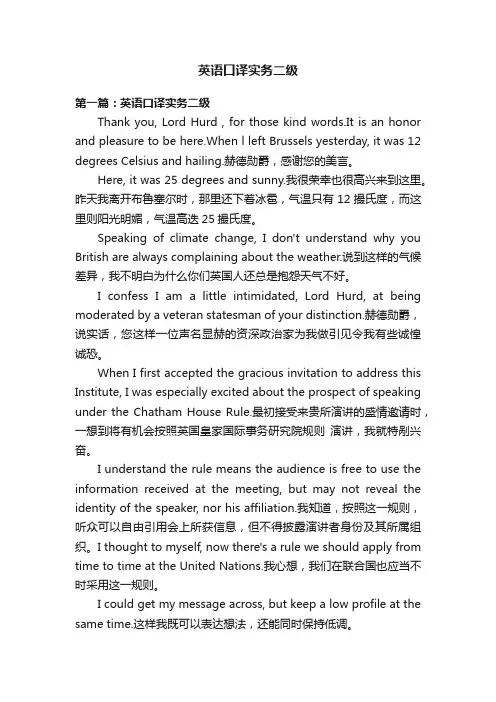
英语口译实务二级第一篇:英语口译实务二级Thank you, Lord Hurd , for those kind words.It is an honor and pleasure to be here.When l left Brussels yesterday, it was 12 degrees Celsius and hailing.赫德勋爵,感谢您的美言。
Here, it was 25 degrees and sunny.我很荣幸也很高兴来到这里。
昨天我离开布鲁塞尔时,那里还下着冰雹,气温只有12撮氏度,而这里则阳光明媚,气温高迭25撮氏度。
Speaking of climate change, I don't understand why you British are always complaining about the weather.说到这样的气候差异,我不明白为什么你们英国人还总是抱怨天气不好。
I confess I am a little intimidated, Lord Hurd, at being moderated by a veteran statesman of your distinction.赫德勋爵,说实话,您这样一位声名显赫的资深政治家为我做引见令我有些诚惶诚恐。
When I first accepted the gracious invitation to address this Institute, I was especially excited about the prospect of speaking under the Chatham House Rule.最初接受来贵所演讲的盛情邀请时,一想到将有机会按照英国皇家国际事务研究院规则演讲,我就特剐兴奋。
I understand the rule means the audience is free to use the information received at the meeting, but may not reveal the identity of the speaker, nor his affiliation.我知道,按照这一规则,听众可以自由引用会上所获信息,但不得披露演讲者身份及其所属组织。
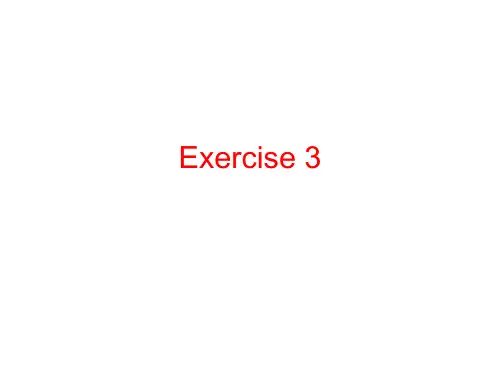
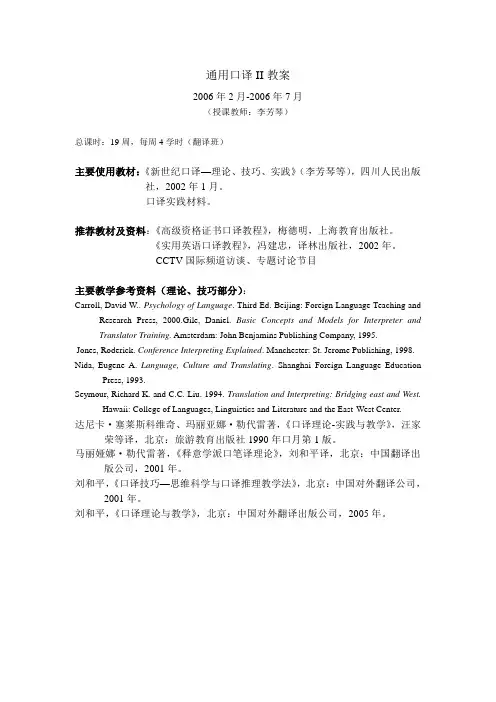
通用口译II教案2006年2月-2006年7月(授课教师:李芳琴)总课时:19周,每周4学时(翻译班)主要使用教材:《新世纪口译—理论、技巧、实践》(李芳琴等),四川人民出版社,2002年1月。
口译实践材料。
推荐教材及资料:《高级资格证书口译教程》,梅德明,上海教育出版社。
《实用英语口译教程》,冯建忠,译林出版社,2002年。
CCTV国际频道访谈、专题讨论节目主要教学参考资料(理论、技巧部分):Carroll, David W.. Psychology of Language. Third Ed. Beijing: Foreign Language Teaching and Research Press, 2000.Gile, Daniel. Basic Concepts and Models for Interpreter and Translator Training. Amsterdam: John Benjamins Publishing Company, 1995.Jones, Roderick. Conference Interpreting Explained. Manchester: St. Jerome Publishing, 1998. Nida, Eugene A. Language, Culture and Translating. Shanghai Foreign Language Education Press, 1993.Seymour, Richard K. and C.C. Liu. 1994. Translation and Interpreting: Bridging east and West.Hawaii: College of Languages, Linguistics and Literature and the East-West Center.达尼卡·塞莱斯科维奇、玛丽亚娜·勒代雷著,《口译理论-实践与教学》,汪家荣等译,北京:旅游教育出版社1990年口月第1版。
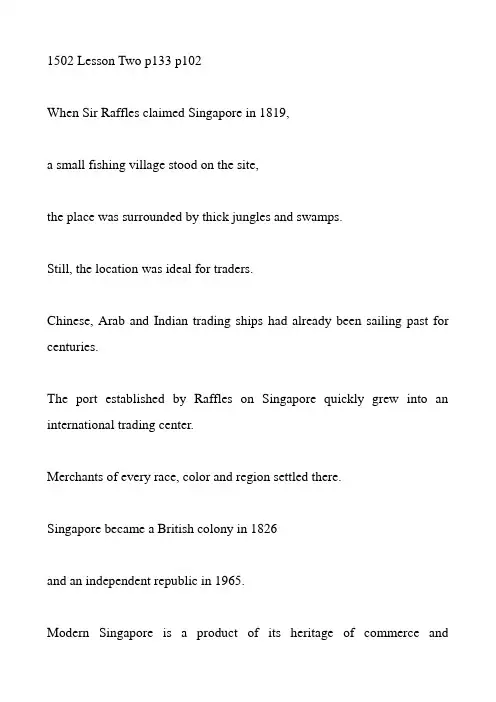
1502 Lesson Two p133 p102When Sir Raffles claimed Singapore in 1819,a small fishing village stood on the site,the place was surrounded by thick jungles and swamps.Still, the location was ideal for traders.Chinese, Arab and Indian trading ships had already been sailing past for centuries.The port established by Raffles on Singapore quickly grew into an international trading center.Merchants of every race, color and region settled there.Singapore became a British colony in 1826and an independent republic in 1965.Modern Singapore is a product of its heritage of commerce andimmigration.Singapore has many names.According to legend, a prince visiting the island saw an animal that looked like a lion.He named the island Singa Pura, or Lion City.Another for Singapore is the Garden City.The tree-lined streets, green parks and lush nature reserves show how Singapore got this name.Perhaps the best describes Singapore is Instant Asia.The many Asians from different countries living there give visitors an instant view of Asia.Singapore also has many faces. The city surprises visitors with its many languages, cultures, races and religions.Chinese, Malays and Indians all live side by side.Besides these main groups, Indonesians, Arabs, Eurasians, Europeans and many others also call Singapore home.Singapore has many names.According to legend, a prince visiting the island saw an animal that looked like a lion.He named the island Singa Pura, or Lion City.Another name for Singapore is the Garden City.The tree-lined streets, green parks and lush nature reserves show how Singapore got this name.Perhaps the name that best describes Singapore is Instant Asia.The many Asians from different countries living there give visitors an instant view of Asia.Singapore also has many faces. The city surprises visitors with its many languages, cultures, races and religions.Chinese, Malays and Indians all live side by side.Besides these main groups, Indonesians, Arabs, Eurasians, Europeans and many others also call Singapore home.They all add their dash of spice to Singapore’s rich culture blend.The mix of traditional costumes, cuisines and festivals makes Singapore sizzle with activity and color.A variety of festivals throughout the year offers visitors a taste of the major culture and religions.The government of Singapore fosters a tolerant society.It encourages citizens to be clean, courteous and law-abiding.The religious festivals of the major faiths are observed as national holidays.The language policy also fosters harmony.Everyone must learn at least two of four official languages: English,Chinese, Malay and Tamil.Many multiethnic countries study Singapore as an example of how many races can live together harmoniously.Singapore’s delicious cuisine and fine shopping draw visitors from all over the world.The choice of restaurants offers something to please every appetite and budget.Singapore is a favorite with serious shoppers, because Singapore is a duty-free port,many goods are cheaper there than in their country of origin.Singapore shopping arcades easily rival those of Hong Kong.Children of all ages will enjoy the Singapore Zoological Gardens.The zoo has a large colony of orangutans.Visitor to the zoo can have breakfast or tea with an orangutan, but theymust book in advance.The zoo’s newest attraction, the Night Safari, offers a chance to observe the nocturnal habits of many wild animals.Another must-see is Singapore’s Sentosa Island.Billed as a holiday resort for the whole family, the island offers enough to keep everyone busy all day.Sports fans will enjoy golf, roller-skating and water sports.Underwater W orld and the Butterfly Park display some of the natural beauty native to the area.Orchid Fantasy is a garden where beautiful and unusual orchids bloom.For history lovers, Fort Siloso has a wax museum commemorating the colonial days of Singapore.The Asian Village is a showcase for ethnic specialties of the region:food, architecture, arts and crafts.It also offers an amusement park.Singapore is a crossroads for people from all over the world.This multicultural, multiracial city-state boasts the highest living standard and GNP in Southeast Asia.Singaporeans are proud of their tidy, prosperous city.They work hard to make sure that everyone feels welcome.。
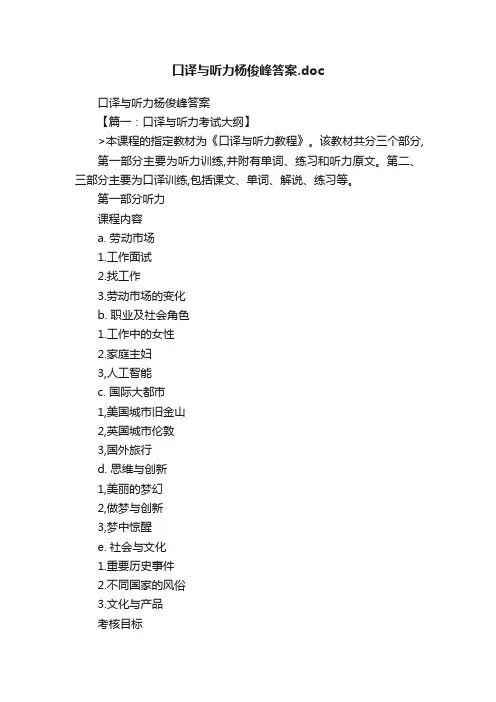
口译与听力杨俊峰答案.doc口译与听力杨俊峰答案【篇一:口译与听力考试大纲】>本课程的指定教材为《口译与听力教程》。
该教材共分三个部分, 第一部分主要为听力训练,并附有单词、练习和听力原文。
第二、三部分主要为口译训练,包括课文、单词、解说、练习等。
第一部分听力课程内容a. 劳动市场1.工作面试2.找工作3.劳动市场的变化b. 职业及社会角色1.工作中的女性2.家庭主妇3,人工智能c. 国际大都市1,美国城市旧金山2,英国城市伦敦3,国外旅行d. 思维与创新1,美丽的梦幻2,做梦与创新3,梦中惊醒e. 社会与文化1.重要历史事件2.不同国家的风俗3.文化与产品考核目标听懂并能理解英语国家的人正常语速的交流(120~150 单词/分钟),掌握教材内出现的词汇、语法项目、常用的口语表达方式等, 能回答(包括口头和笔头回答)就课文内容提出的问题。
第二部分口译:常规部分课程内容1.开幕式2.闭幕式3.欢迎词4.祝酒词5.大会宣言考核目标掌握一般会议的口译程序,各种会议礼节性讲话,如开幕式、闭幕式、欢迎词、祝酒词、大会宣言等的常见格式及口译技巧。
能迅速、流利、准确地转达发言人的讲话内容,语气、语调基本正确, 用词基本得当,句法规范。
第三部分口译:专题部分课程内容1,旅游2.经济3.政治4.教育5.科技6.体育7.环保8.工业9.农业10.社会问题11.人居、环境与持续发展考核目标每个专题都有自己的特点,如旅游专题介绍与旅游有关的内容,其中包括历史知识、地理知识、旅游资源等。
专题类的内容一般专有名词如人名地名出现频繁,学习时要有的放矢,根据不同专题的不同要求,掌握教材中所出现的词汇、固定用法以及有关知识。
能比较流利、基本准确地转达发言人的讲话内容,语气、语调基本正确,用词基本得当, 句法不出现大错误。
三、考试大纲实施要求高等教育自学考试是一种国家考试。
它既是对社会自学者进行的学历考试,也是个人自学、社会助学和国家考试相结合的一种新5.关于命题考试的若干规定a: 听力考试a)考试形式:闭卷,笔试,满分50 分。
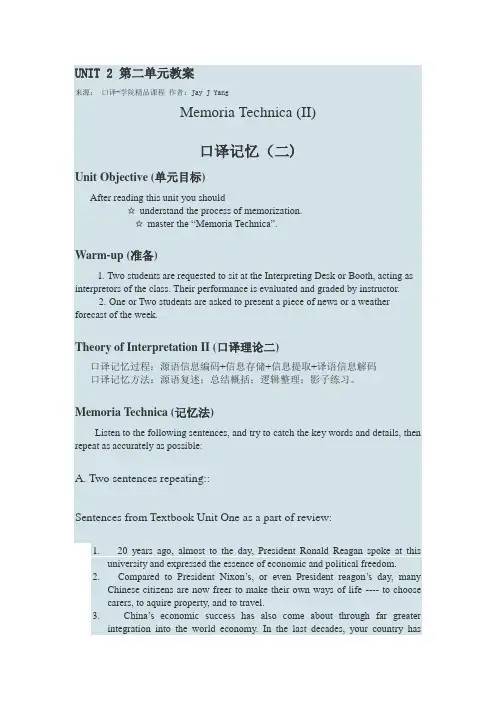
UNIT 2 第二单元教案来源:口译-学院精品课程作者:Jay J YangMemoria Technica (II)口译记忆(二)Unit Objective (单元目标)After reading this unit you should☆ understand the process of memorization.☆ master the “Memoria Technica”.Warm-up (准备)1. Two students are requested to sit at the Interpreting Desk or Booth, acting as interpretors of the class. Their performance is evaluated and graded by instructor.2.One or Two students are asked to present a piece of news or a weather forecast of the week.Theory of Interpretation II (口译理论二)口译记忆过程:源语信息编码+信息存储+信息提取+译语信息解码口译记忆方法:源语复述;总结概括;逻辑整理;影子练习。
Memoria T echnica (记忆法)Listen to the following sentences, and try to catch the key words and details, then repeat as accurately as possible:A. Two sentences repeating::Sentences from Textbook Unit One as a part of review:1.20 years ago, almost to the day, President Ronald Reagan spoke at thisuniversity and expressed the essence of economic and political freedom.pared to President N ixon’s, or even President reagon’s day, manyChinese citizens are now freer to make their own ways of life ---- to choose carers, to aquire property, and to travel.3.China’s economic success has also come about through far greaterintegration into the world economy. In the last decades, your country hasemerged as major exporter of all kinds of manufactured goods, from heavy machinery, to computers, to toys.Sentences prepared by instructor:4.The European colonists first sailed west to America and founded their firstsettlements on the Atlantic Coast.5.The United States became the World’s first modern democracy after itsbreak with Great Britain in 1776 and the adoption of a constitution in 1789.6.Congress is the legislative branch of the Union. It consists of two houses:the House of representatives and the Senate. according the constitution, thetwo houses are of equal importance and check each other.7.The US has the most technologically powerful, diverse, advanced andlargest economy in the world, with a per capita GDP of $33,900.8.Lishui College is co-administrated by the Provincial EducationCommission and the city government.9.China’s institutions of higher learning are classified as comprehensiveuniversities, science and engineering universities and specialized institutes.10.At present, Chinese educational system can be divided into four stages.Preschool education refers to the period of going to nurseries andkindergartens. School age begins at 6. Primary education lasts for 6 years, so does the secondary education. It takes 4 years for students to finish tertiaryeducation.11.In kindergartens, children are mainly taught some basic morals, such ashonesty, courage, discipline, cooperation and good manners, and basic knowledge of simple arithmetic, drawing, singing and dancing.12.Lishui 2nd Middle School is a key school of the province. The major coursesstudents take are Chinese, Mathematics, English, Politics, History, Geography, Biology, physics, Chemistry, physical Culture, Music and Fine Arts.13.The former Lishui TeacherCollege was founded in 1978. It was upgradedinto the LishuiUniversity last year. There are now about 8000 students of undergraduates. Most of them are residential.14.Universities have been undergoing some educational reforms in recent years.An obvious method is to adopt credit system, which allows students to graduate ahead of schedule when they complete the regulated credits.15.Starting from a few years ago,, students have to pay for their schooling in theform of tuition fee. In order to encourage students to study hard, Universitiesgrants scholarship at different levels with a total coverage of 70%.B. Retelling an article:A SpeechOn behalf of Oxford University , I would like to thank you for all you have done for us. Ever since we arrived, we have been enjoying nothing but the warmest friendship and hospitality. Y ou have opened your hearts as well as your homes to us. While our stay has been very short, we feel that it has been very rewarding, not only professionally, but in making new friends and broadening the channels of contact.I would like to conclude with the hope that all of you will have a chance to come to the United States very soon, not only to continue our common pursuits of professional interest, but to partake out hospitality as well.Finally allow me to propose a toast to the health and happiness of all the ladies and gentlemen present here.Cultural Salon or Seminar (文化沙龙或研讨会)In the last 20 minutes will be a cultural salon or seminar. Two or three students who have been asked to prepare a speech in advance on a given topic. Students will do the oral interpretation.Topic: My HometownHomework Assignments (课后作业)Work on Exercise 1-2 in Unit 2 of the Textbook: Text 1.1, Text 2.1Task: Listen to the article and then start repeating at the end of each segment.Reference (单元参考资料)仲伟合主编:《英语口译教程》(上下册),高等教育出版社,2005年版。
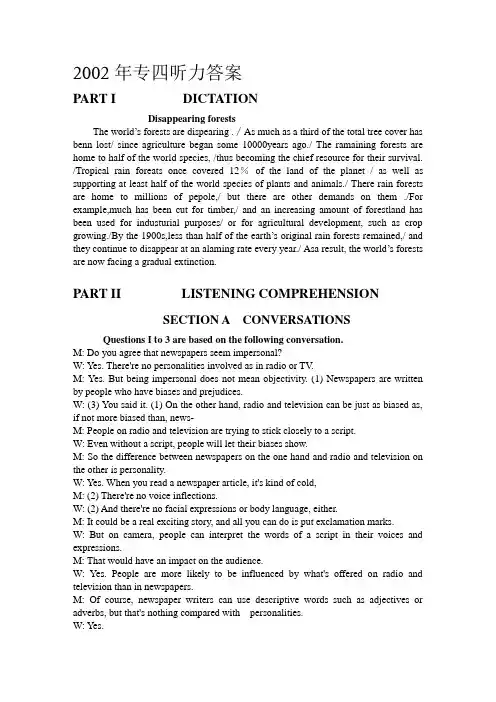
2002年专四听力答案PART I DICTATIONDisappearing forestsThe world’s forests are dispearing .∕As much as a third of the total tree cover has benn lost/ since agriculture began some 10000years ago./ The ramaining forests are home to half of the world species, /thus becoming the chief resource for their survival. /Tropical rain foreats once covered 12%of the land of the planet / as well as supporting at least half of the world species of plants and animals./ There rain forests are home to millions of pepole,/ but there are other demands on them ./For example,much has been cut for timber,/ and an increasing amount of forestland has been used for industurial purposes/ or for agricultural development, such as crop growing./By the 1900s,less than half of the earth’s original rain forests remained,/ and they continue to disappear at an alaming rate every year./ Asa result, the world’s forests are now facing a gradual extinction.PART II LISTENING COMPREHENSIONSECTION A CONVERSATIONSQuestions I to 3 are based on the following conversation.M: Do you agree that newspapers seem impersonal?W: Yes. There're no personalities involved as in radio or TV.M: Yes. But being impersonal does not mean objectivity. (1) Newspapers are written by people who have biases and prejudices.W: (3) You said it. (1) On the other hand, radio and television can be just as biased as, if not more biased than, news-M: People on radio and television are trying to stick closely to a script.W: Even without a script, people will let their biases show.M: So the difference between newspapers on the one hand and radio and television on the other is personality.W: Yes. When you read a newspaper article, it's kind of cold,M: (2) There're no voice inflections.W: (2) And there're no facial expressions or body language, either.M: It could be a real exciting story, and all you can do is put exclamation marks.W: But on camera, people can interpret the words of a script in their voices and expressions.M: That would have an impact on the audience.W: Yes. People are more likely to be influenced by what's offered on radio and television than in newspapers.M: Of course, newspaper writers can use descriptive words such as adjectives or adverbs, but that's nothing compared with personalities.W: Yes.M: Personality sells.Key: 1.C 2.B 3.AQuestions 4 to 6 are based on the following conversation.W: Welcome to visit out city, Mr. Lewis-but, of course, you have been here before, haven't you?M: Yes, I have. What a good memory I have I I was here for the Arts Festival last year.W; And what will you be doing this year?M: (4) Oh,I came here primarily for a holiday and to see some friends. But I will also be giving private cello lessons as well.W: I believe that your cello is rather special. Is that true?M; Oh, yes. It was made for my uncle by a very expert German cello maker called Schuster. (5) When I began cello lessons at the age of eight, he said that when I grew big enough to handle a full-sized cello, he would give it to me.W: (5)So when a child begins to play the cello, he or she starts on a smaller instrument?M: (5) Of course, or he would be very uncomfortable. Many children begin with half-sized cello, but as I was big for my age, I began with a two-third-sized cello.W: Are you going to other places on this trip and will you take your cello with you? M: Yes, very definitely.W: But, isn't it difficult to take a cello around with you?M: Not really. (6)1 just receive two seats when I'm traveling anywhere, one for me and one for my cello. It's such a precious instrument to me that it hardly ever leaves my side.Key: 4.B 5.C 6.CQuestions 7 to 10 are based on the following conversation.M: Good morning, Miss Brown. Have a seat please. I have been looking through your application. You seem to have many of the qualifications needed for this position, especially the experience.W: I have been working in hotels for eight years now.M: Oh, really. Were you satisfied with your last position?W: (7) Well, to be honest, not entirely. The chances for advancement were very slim. M: I see. Was it hard work?W: No, it's an interesting job and I loved meeting people. I know how to handle a bad-tempered guest.M: (9) But have you done anything to do with —a tour guide?W: (8)1 did work for a short time as an attendant for a tour operator, taking foreigners on guided tours of London.M: (9)Do you speak any foreign languages?W: Yes. I speak German and Spanish—you see ,(10)1 spent several years abroad when I was young.M: Oh, did you? Next is the question of salary, of course.W: ( 10) Well, I used to get 2 000 monthly, so I couldn't accept less than that.M: Well, (9) we ask for loyalty and hard work from our employees. But we pay well, and opportunities for promotion depend on merit, not just on age or seniority.W: Mr. Robert, (10) I don't mind working hard and working overtime.M: That's fine. (10)1 have a few more applicants to interview today for this position. But at the moment, your chance looks very good.W: I'm glad to hear it.Key: 7.C 8.C 9.B 10.CSECTION B PASSAGESQuestions II to 13 are based on the following passage.Even a careful motorist may have the misfortune to commit a motoring offence. In due course, having received a summons , he will appear in (11) what is commonly known as a police-court. This is a court presided over by a civil officer, who tries cases without a jury. A civil officer, has powers to pass sentence for relatively minor offences only; serious charges are dealt with by a judge and jury.When his case comes up in court, the motorist hears his name called by the clerk of the court, and comes forward to identify himself. The civil officer then calls for the policeman who charged the offender and asks him to give evidence. (12)The policeman also is expected to give an account of what happened when the offence was committed and to mention any special circumstances. For instance, the offence may have been partly due to the foolishness of another motorist. It would be unwise for the accused motorist to exaggerate this. It will not help his case to try to blame someone else for his own mistake.The civil officer, on hearing that some other motorist is involved, will doubtless say, " What is being done about this man? ""Case coming up later this afternoon, "may will be the answer.(13) If you are guilty, it is of course wise to plead guilty and apologize for committing the offence and taking up the court's time.Key:11.A 12.A 13.BQuestions 14 to 16 are based on the following passage.Scientists say there are more than 350 different kinds of sharks.Sharks do not have bones ,(14) and a shark has an extremely good sense of smell. It can find small amounts of substances in the water, such as blood, body liquids and chemicals produced by animals. Sharks also sense electrical and magnetic power linked to nerves and muscles of living animals. These powerful senses help them find their food. Some sharks will eat just about anything. Many unusual things have been found in the stomachs of some tiger sharks. They include shoes, dogs, a cow's foot and metal protective clothing.About forty percent of the different kinds of sharks lay eggs. The others give birthto live young. Some sharks carry their young inside their bodies like humans do.Scientists are beginning to understand the importance of sharks to humans. (15) Medical researchers want to learn more about the shark's body defense system against disease. They know that sharks recover quickly from injuries. Sharks appear never to suffer infections, cancer or heart diseases.Key: 14.B 15.B 16.DQuestions 17 to 20 are based on the following passage.Not every service or product meets your satisfaction. When you are dissatisfied, you should voice your dissatisfaction. (17) One reason for doing so is to help the vendor know there is a problem. The problem may have been created at a lowerlevel in the vendor's company, and the vendor himself may know nothing about it &t all. You help him when you bring weaknesses or failures to his attention.A second reason for writing a letter of complaint to a vendor is to seek compensation. You may not wish to pursue the matter so far as to take legal action, but you may wish to give the vendor the opportunity of making good. ( 18) Most vendors value your business and their reputation sufficiently to replace defective goods on their own initiative or refund money when necessary. This is the preferred way of making a vendor answer your complaint. No vendor likes to do so, but (19) your carefully worded letter of complaint may motivate him to do so.When you write a letter of complaint, you'd better keep these tips in mind: ( 20 ) First, be polite though firm. You will not win a vendor's cooperation by anger. Secondly, be reasonable. Show logically and factually that the fault lies with the vendor. Thirdly, be specific about what is wrong and what you want done about it. Lastly, tell how you have been hurt or inconvenienced by the problem. This strengthens your argument for compensation.Key: 17.A 18. C 19.D 20.DSECTION C NEWS BROADCASTNews Item IBritain has announced that it decided to cancel about 200 million pounds of world debts owed to it by poor common-wealth countries. The international development secretary says (21) the relief has been offered to countries committed to eliminating poverty, and pursuing good sovemment. These would include taking actions against corruption. At the same time, common market finance ministers are meeting in Malaysia. Britain is expected to put forth a fresh initiative on reducing the debts of the poorest countries. (22) The Charles Levine strategist has indicated that they plan to revive the scheme put forward last year by the International Monetary Fund, which has not yet provided any relief.Key: 21.D 22.BNews Item 2(23) An underground train derailed at the station in central Paris yesterday, injuring 23 people and just missing another underground train standing on the opposite track. French emergency services said the train was traveling at 35 kilometers per hour when it derailed as it entered the station. No one has been killed and no one was trapped in train during the accident. Ambulances rushed to the scene and doctors began treating casualties in the station. In a nearby cafe, some people have broken limbs and others have suffered bruising. (24) None was in a critical condition. Last night, it was not known why the train came off the tracks.Key: 23.C 24.ANews Item 3(25) Argentina civil servants held a 24-hour strike yesterday to protest pay cuts of 12-15% for anyone earning more than 1 000 V. S. dollars a month. Public service unions and the local teamsters planned to hold the protest rally in front ofthe government house. (26) The work stoppage comes after last Friday's general strike when many of Argentina's 12 millions workers stayed home after the nation's powerful General Workers Confederation, the nation's largest union group, called a one-day strike to protest spending cuts and free market reforms.Key: 25.C 26.ANews Item 4(27) Germany was due to strike a deal yesterday to close down its 19 nuclear power plants, making it the first major industrial nation to commit to withdrawing from nuclear energy. The talks between chancellor of the Kern government and the chiefs of the German energy industry began at 8: 30 p.m. (28) Closure of Germany's 19 reactors, which provided around a third of the country's electricity needs, was the key pledge of the Greenes, the junior partner in this coalition government.Key: 27.D 28.CNews Item 5(29) The UN children's program UNICEF says it plans to help millions of African children return to school or start classes for the first time next year. The agency's executive director says more than twenty-four million children in Africa are not in school because of discrimination, school fees or other factors. Meanwhile the chief UN office for refugees (30)is asking for additional fifty-six million dollars for food and housing for people fleeing ethnic violence in Sudan's western Darfur region. A spokesman says Secretary General Kofi Annan is planning to visit the region soon.。
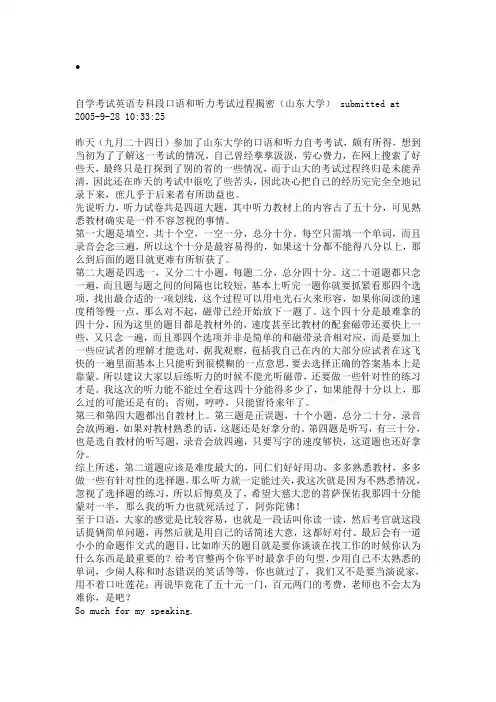
自学考试英语专科段口语和听力考试过程揭密(山东大学) submitted at 2005-9-28 10:33:25
昨天(九月二十四日)参加了山东大学的口语和听力自考考试,颇有所得,想到当初为了了解这一考试的情况,自己曾经孳孳汲汲,劳心费力,在网上搜索了好些天,最终只是打探到了别的省的一些情况,而于山大的考试过程终归是未能弄清,因此还在昨天的考试中很吃了些苦头,因此决心把自己的经历完完全全地记录下来,庶几乎于后来者有所助益也。 先说听力,听力试卷共是四道大题,其中听力教材上的内容占了五十分,可见熟悉教材确实是一件不容忽视的事情。 第一大题是填空,共十个空,一空一分,总分十分。每空只需填一个单词,而且录音会念三遍,所以这个十分是最容易得的,如果这十分都不能得八分以上,那么到后面的题目就更难有所斩获了。 第二大题是四选一,又分二十小题,每题二分,总分四十分。这二十道题都只念一遍,而且题与题之间的间隔也比较短,基本上听完一题你就要抓紧看那四个选项,找出最合适的一项划线,这个过程可以用电光石火来形容,如果你阅读的速度稍等慢一点,那么对不起,磁带已经开始放下一题了。这个四十分是最难拿的四十分,因为这里的题目都是教材外的,速度甚至比教材的配套磁带还要快上一些,又只念一遍,而且那四个选项并非是简单的和磁带录音相对应,而是要加上一些应试者的理解才能选对,据我观察,苞括我自己在内的大部分应试者在这飞快的一遍里面基本上只能听到很模糊的一点意思,要去选择正确的答案基本上是靠蒙。所以建议大家以后练听力的时候不能光听磁带,还要做一些针对性的练习才是。我这次的听力能不能过全看这四十分能得多少了,如果能得十分以上,那么过的可能还是有的;否则,哼哼,只能留待来年了。 第三和第四大题都出自教材上。第三题是正误题,十个小题,总分二十分,录音会放两遍,如果对教材熟悉的话,这题还是好拿分的。第四题是听写,有三十分,也是选自教材的听写题,录音会放四遍,只要写字的速度够快,这道题也还好拿分。 综上所述,第二道题应该是难度最大的,同仁们好好用功,多多熟悉教材,多多做一些有针对性的选择题,那么听力就一定能过关,我这次就是因为不熟悉情况,忽视了选择题的练习,所以后悔莫及了,希望大慈大悲的菩萨保佑我那四十分能蒙对一半,那么我的听力也就死活过了,阿弥陀佛! 至于口语,大家的感觉是比较容易,也就是一段话叫你读一读,然后考官就这段话提俩简单问题,再然后就是用自己的话简述大意,这都好对付。最后会有一道小小的命题作文式的题目,比如昨天的题目就是要你谈谈在找工作的时候你认为什么东西是最重要的?给考官整两个你平时最拿手的句型,少用自己不太熟悉的单词,少闹人称和时态错误的笑话等等,你也就过了,我们又不是要当演说家,用不着口吐莲花;再说毕竟花了五十元一门,百元两门的考费,老师也不会太为难你,是吧? So much for my speaking. 课程性质:《口译与听力》(听力部分)()是高等教育自学考试英语专业基础课考试计划中的一门必修课。总体水平相当于普通高等院校英语专业四年制本科结业时的听力水平。 课程要求: 1. 能听懂英语国家人士关于日常生活、社会与文化的讲话、交谈或讲座,理解中心大意,抓住主要论点。 2. 能听懂英语国家有关政治、经济、历史、文化以及风土人情的广播和道煊节目的主要内容。 3. 语速为每分钟150-170词,接近英语国家人士的日常说话速度。 学习书目:《英语高级听力》,何其莘等编写,外语教学与研究出版社,1992年版。 考试安排:考试时间共约30分钟 满分100分,共分四部分。每个问题答题时间为14秒。除第三部分短文填空读三遍外,其它题型均只读一遍。 题量及分值: Part I 10个小题,每小题2分,共20分 Part II 10个小题,每小题2分,共20分 Part III 15个空,每空2分,共30分 Part IV 10个小题,每小题3分,共30分 题型说明: Part I 是陈述(Statement),问题在考生卷中印出。 Part II是对话(Conversation)。 Part III为短文填空(Text Completion),每空填一个词或数字。短文的题材主要涉及社会、教育、文化、风俗人情、历史地理等方面的内容,多选自英语母语者的演讲和讲座等。 Part IV为新闻报道(News Broadcast),本部分一般由5条新闻组成,均为政治、经济、文化、社会等方面的重要新闻。就每条新闻提出2个问题,问题在考生卷中印出。 样题举例: Part I STATEMENT In this part of the test you will hear 10 short statements. After each statement there will be a 14-second pause. During the pause read the question and the four possible choices marked A B C and D and decide which one is closest in meaning to the statement you have just heard. On the ANSWER SHEET mark your choice of answer. ( 20%) 1. 听力原文 To apply for your VISA you need to go to Room 201 first to confirm your identity. Q: Where are you most likely to hear this statement? 考生卷 Q: Where are you most likely to hear this statement? A. In a police station. B. In a tourist information centre. C. In a foreign embassy. D. In a bank. 2. 听力原文 I have found another problem with my washing machine as if one is not enough. Q: What is the speaker trying to say? 考生卷 Q: What is the speaker trying to say? A. The speaker is not sure about the number of the problems. B. The speaker is complaining about the quality of the washing machine. C. The speaker is trying to find more problems. D. The speaker is ready to buy another washing machine. 3. 听力原文 Cathy’s dresses are anything but expensive though she has a substantial bank account. Q: What can we infer about Cathy? 考生卷 Q: What can we infer about Cathy? A. She sets up a special account to buy expensive dresses. B. She spends a lot on her dresses. C. She puts every penny she saves to her bank account. D. She doesn’t spend much on her dresses.
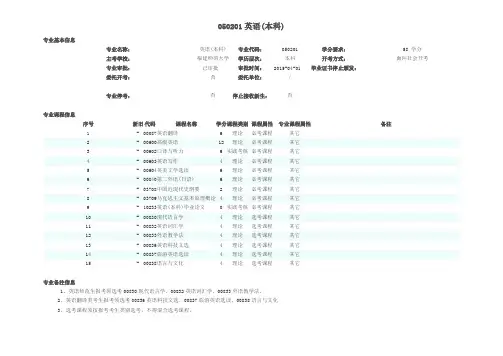
050201英语(本科)专业基本信息专业名称:英语(本科) 专业代码:050201 学分要求:58 学分主考学校:福建师范大学学历层次:本科开考方式:面向社会开考专业审批:已审批审批时间:2015-04-01 毕业证书停止颁发:委托开考:否委托单位:/专业停考:否停止接收新生:否专业课程信息序号新旧代码课程名称学分课程类别课程属性专业课程属性备注1 - 00087 英语翻译 6 理论必考课程其它2 - 00600 高级英语12 理论必考课程其它3 - 00602 口译与听力 6 实践考核必考课程其它4 - 00603 英语写作 4 理论必考课程其它5 - 00604 英美文学选读6 理论必考课程其它6 - 00840 第二外语(日语) 6 理论必考课程其它7 - 03708 中国近现代史纲要 2 理论必考课程其它8 - 03709 马克思主义基本原理概论 4 理论必考课程其它9 - 10233 英语(本科)毕业论文0 实践考核必考课程其它10 - 00830 现代语言学 4 理论选考课程其它11 - 00832 英语词汇学 4 理论选考课程其它12 - 00833 外语教学法 4 理论选考课程其它13 - 00836 英语科技文选 4 理论选考课程其它14 - 00837 旅游英语选读 4 理论选考课程其它15 - 00838 语言与文化 4 理论选考课程其它专业备注信息1、英语师范生报考须选考00830现代语言学、00832英语词汇学、00833外语教学法。
2、英语翻译类考生报考须选考00836英语科技文选、00837旅游英语选读、00838语言与文化3、选考课程须按报考考生类别选考,不得混合选考课程。
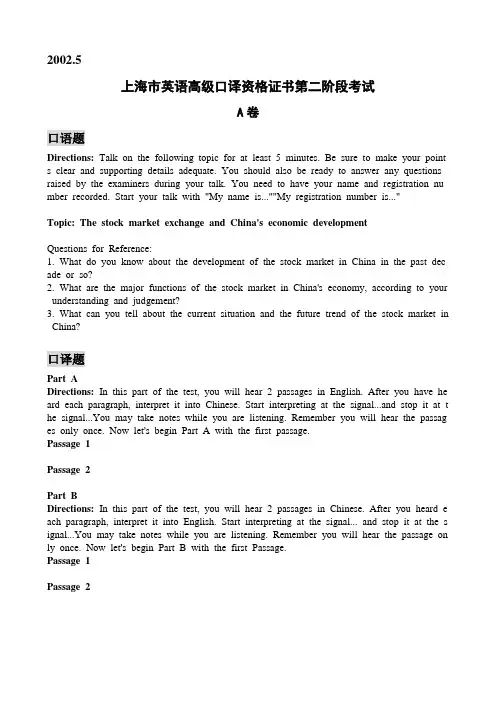
2002.5上海市英语高级口译资格证书第二阶段考试A卷口语题Directions: Talk on the following topic for at least 5 minutes. Be sure to make your point s clear and supporting details adequate. You should also be ready to answer any questions raised by the examiners during your talk. You need to have your name and registration nu mber recorded. Start your talk with "My name is...""My registration number is..."Topic: The stock market exchange and China's economic developmentQuestions for Reference:1. What do you know about the development of the stock market in China in the past dec ade or so?2. What are the major functions of the stock market in China's economy, according to your understanding and judgement?3. What can you tell about the current situation and the future trend of the stock market in China?口译题Part ADirections: In this part of the test, you will hear 2 passages in English. After you have he ard each paragraph, interpret it into Chinese. Start interpreting at the signal...and stop it at t he signal...You may take notes while you are listening. Remember you will hear the passag es only once. Now let's begin Part A with the first passage.Passage 1Passage 2Part BDirections: In this part of the test, you will hear 2 passages in Chinese. After you heard e ach paragraph, interpret it into English. Start interpreting at the signal... and stop it at the s ignal...You may take notes while you are listening. Remember you will hear the passage on ly once. Now let's begin Part B with the first Passage.Passage 1Passage 2口语题Directions: Talk on the following topic for at least 5 minutes. Be sure to make your point s clear and supporting details adequate. You should also be ready to answer any questions raised by the examiners during your talk. Your need to have your name and registration nu mber recorded. Start your talk with "My name is...""My registration number is..."Topic: Should the recommendation admission system be kept?Questions for Reference:1. Some distinguished middle school students have been admitted to universities through the recommendation system, but it has been said that some people have taken advantage of th e system. Comment on both or either of these two facts. Cite examples to illustrate your p oint(s).2. What are the advantages and/or disadvantages of the recommendation system?3. Give the current college entrance examination, should we totally abandon the recommend ation system? Or should we reform both or either of them?口译题Part ADirections: In this part of the test, you will hear 2 passages in English. After you have he ard each passage, interpret it into Chinese. Start interpreting at the signal...and stop it at th e signal...You may take notes while you are intervening. Remember you will hear the passa ges only once. Now let's begin Part A with the first passage.Passage 1Passage 2Part BDirections: In this part of the test, you will hear 2 passages in Chinese. After you have h eard each paragraph, interpret it into English. Start interpreting at the signal...and stop it at the signal...You may take notes while you are listening. Remember you will hear the passa ge only once. Now let's begin Part B with the first passage.Passage 1Passage 2参考答案:Part APassage 1:对一个雄心勃勃的公司来说,仅仅成为一个家喻户晓的品牌是不够的。
2002年6月大学英语四级(CET-4)真题试卷Part I Listening Comprehension (20 minutes)Section ADirections: In this section, you will hear 10 short conversations. At the end of each conversation, a question will be asked about what was said. Both the conversation and the question will be spoken only once. After each question there will be a pause. During the pause, you must read the four choices marked A), B), C) and D), and decide which is the best answer. Then mark the corresponding letter on the Answer Sheet with a single line through the center.1. W: I suppose you’ve bought some gifts for your family. M: Well, I’ve bought a shirt for my father and two books for my sister. But I haven’t decided what to buy for my mother probably some jewels.Q: Who did the man buy the books for?A) His father.B) His mother.C) His brother.D) His sister.2. W: Look, it says they want a junior sales manager and it seems like it’s a big company. That’ll be good for you might haveto travel a lot.M: Do they say anything about the experience?Q: What are they talking about?A) A job opportunity.B) A position as general manager.C) A big travel agency.D) An inexperienced salesman.3. W: I think we’ve covered everything. What about a cup of coffee before we move onto the next item?M: Good idea. I really can’t wait another minute.Q: What does the woman suggest doing?A) Having a break.B) Continuing the meeting.C) Moving on to the next item.D) Waiting a little longer.4. W: But what happens if it rains. What are we going to do then? M: We’ll have to count on good weather. But if it does rain the whole thing will have to be canceled.Q: What do we learn from the conversation?A) The weather forecast says it will be fine.B) The weather doesn’t count in their plan.C) They will not do as planned in case of rain.D) They will postpone their program if it rains.5. W: You took an optional course this semester didn’t you? How is it going?M: Terrible. It seems like the more the professor talks the less I understand.Q: How does the man feel about the course?A) He wishes to have more courses like it.B) He finds it hard to follow the teacher.C) He wishes the teacher would talk more.D) He doesn’t like the teacher’s accent.6. W: Mark is playing computer games.M: Should he do that when the final exam is drawing near? Q: What does the man think Mark should do?A) Go on with the game.B) Draw pictures on the computer.C) Review his lessons.D) Have a good rest.7. M: Jack seems to think this year’s basketball season will be disappointing.W: That’s his opinion. Most others think differently.Q: What does the woman mean?A) She does not agree with Jack.B) Jack’s performance is disappointing.C) Most people will find basketball boring.D) She shares Jack’s opinion.8. M: Is this the check-in counter for Flight 914 to Los Angeles?M: Yes, but I’m sorry the flight is delayed because of a minor mechanical problem. Please wait for further notice.Q: What do we learn from this conversation?A) The man went to a wrong check-in counter.B) The man has just missed his flight.C) The plane will leave at 9:14.D) The plane’s departure time remains unknown.9. M: Excuse me. I’d like to place an advertisement for a used car in this Sunday edition of your paper.W: Ok, but you have to run your advertisement all week. We can’t quote rates for just Sunday.Q: Where is the conversation most probably taking place?A) At a newsstand.B) At a car dealer’s.C) At a publishing house.D) At a newspaper office.10. M: I spend so much time polishing my letter application.W: It’s worthwhile to make the effort. You know just how important it is to give impression.Q: What do we know about the man?A) He wants to get a new position.B) He is asking the woman for help.C) He has left the woman a good impression.D) He enjoys letter writing.Section BDirections: In this section, you will hear 3 short passages. At the end of each passage, you will hear some questions. Both the passage and the questions will be spoken only once. After you hear a question, you must choose the best answer from the four choices marked A), B), C) and D). Then mark the corresponding letter on the Answer Sheet with a single line through the center.Passage oneQuestions 11 to 13 are based on the passage you have just heard. Not everybody reads the daily newspaper. People who don’t read newspaper are sometimes referred to as non-readers. Early research has shown that the non-readers are generally low in education low in income either very young or very old. In addition non-readers are more likely to live in rural areas andhave less contact with neighbors and friends. Other studies show that non-readers tend to isolate themselves from the community and less likely to own a home and seldom belong to local voluntary organizationsWhy don’t these people read daily paper? They say they don’t have the time they prefer radio or TV they have no interest in reading a tale and besides they think newspapers are too expensive. Recent surveys however, have indicated the portrait of the non-reader is more complicated than first thought. There appears to be a group of non-readers that do not fit the type mentioned above. They are high in income and fall into the age group of 26 to 65. They are far move likely to report that they don’t have the time to read the papers and they have no interest in the content. Editors and publishers are attempting to win them back. First they are also adding news briefs and comprehensive indexes. This will help overcome the time problem. And they are also giving variety to newspaper content to help build the reader’s interest.Questions 11 to 13 are based on the passage you have just heard.11. What is typical of non-readers according to early research?A) They are interested in other kinds of reading.B) They are active in voluntary services.C) They tend to be low in education and in income.D) They live in isolated areas.12. What are the finds of recent surveys?A) The reasons why –people don’t read newspapers are more complicated than assumed.B) There are more uneducated people among the wealthy than originally expected.C) The number of newspaper readers is steadily increasing.D) There are more nonreaders among young people nowadays.13. What are editors and publishers doing to attract the non-readers?A) Lowering the prices of their newspapers.B) Shortening their news stories.C) Adding variety to their newspaper content.D) Including more advertisements in their newspapers. Passage TwoQuestions 14 to 17 are based on the passage you have just heard. Did you know that there’s a kind of bird that can sew? This called the tailor bird uses its mouth as a needle. It sews leaves together in the shape of a cup then it adds a layer of straw to the inside of the cup and lays its eggs there. Each birdspecies builds its own special kind of nest. The most common materials used for nests are grasses branches and feathers. A bird must weave these materials into a nest. Just imagine building a house without cement or nails to hold together. Another bird is called the weaver bird. The weaver bird builds a nest that looks like a basket the nest shaped like a pear with a hole in the middle. The hole is the door of the nest. A third bird is called the oven bird. The oven bird makes a nest that is very solid. The nest is made of mud. The oven bird forms the mud into the shape of an oven and then let it dry in the sun. The sun bakes the mud making it very hard. Not all birds make their homes in branches. Some birds build their nests on the ground while others bury their eggs under the ground. And some birds do not build nests at all. So when you look for nests and eggs in branches of the trees and bushes remember that some nests may be right your feet.Questions 14 to 17 are based on the passage you have just heard.14. What does the nest built by tailor bird look like?A) A basket.B) A cup.C) A egg.D) An oven.15. Why is there a hole in the weaver bird’s nest?A) To let in the sunshine.B) To serve as its door.C) To keep the nest cool.D) For the bird to lay eggs.16. What is the oven bird’s nest made of?A) Branches.B) Grasses.C) Mud.D) Straw.17. What might surprise us about birds’ nests according to the speaker?A) Some are built underground.B) Some can be eaten.C) Most are sewed with grasses.D) Most are dried by the sun.Passage ThreeQuestions 18 to 20 are based on the passage you have just heard. You can tell the age of a tree by counting its rings but these records of trees’ life really say a lot more. Scientists are using tree rings to learn what’s being happening on the sun’s surface for the last ten thousand years. Each ring representsa year of growth. As the tree grows it adds a layer to its trunk taking up chemical elements from the air. By looking up the elements in the rings for a given year scientists can tell what elements were in the air that year. Doctors Stevenson is analysing one element—carbon-14 in ring from both living and dead trees. Some of the rings go back almost ten thousand years to the end of the Ice Age. When Stevenson followed the carbon-14 trail back in time he found carbon-4 levels change with the intensity of solar burning. You see the sun has cycles. Sometimes it burns fiercely and other times it’s relatively calm. During the sun’s violent periods it throws off charged particles in fast moving strings called solar winds. The particles interfere with the formation of carbon-14 on earth. When there’s more solar wind activity less carbon-14 is produced. Ten thousand years of tree rings show that the carbon-14 level rises and falls about every 420 years. The scientists concluded that the solar wind activity must follow the same cycle.Questions 18 to 20 are based on the passage you have just heard.18. What is the purpose of the scientists in studying tree rings?A) To examine the chemical elements in the Ice Age.B) To look into the pattern of solar wind activity.C) To analyze the composition of different trees.D) To find out the origin of carbon-14 on Earth.19. What affects the amount of carbon-14 on earth?A) The lifecycle of trees.B) The number of trees.C) The intensity of solar burning.D) The quality of air.20. What do we learn from the passage about the solar wind activity?A) It affects the growth of trees.B) It has been increasing since the Ice Age.C) It is determined by the chemicals in the air.D) It follows a certain cycle.2002年6月四级参考答案Part I1. D2. A3. A4. D5. B6. C7. A8. D9. D 10.A11. C 12. D 13. C 14. B 15. B 16. C 17.A 18. A 19. C 20. D。
2002 Lesson Two p286 p228
Traffic congestion is becoming serious problem worldwide, and the pace of road-widening projects is unable to keep up with growing transportation needs.
Therefore, the only solution has been to create intelligent traffic management system,
combining GPS(Global Positioning System) and GIS(Geographic Information System) technology to bring greater convenience to drivers and increase efficiency in transportation industries.
During the decade from 1987 to 1997, GPS matured rapidly, becoming a system with many practical applications.
But what advantages can this system, which is supported by 26 satellites, bring to transportation users and car owners.
Installing a GPS navigation system in each bus would enable drivers to know their exact location, direction and speed at any time.
Moreover, the GPS wireless modem system would send this information to
relay stations along the highway, which would then transmit it to traffic-control centers.
GPS could thus enable transportation companies to keep close track of the whereabouts of their vehicles and optimize scheduling, greatly increasing the efficiency of fleet management.
Because companies would also be able to calculate their operating costs more accurately, they could save on unnecessary investment in vehicles as well.
As for benefits to passengers, GPS would improve service quality and free them from the worry of insufficient information.
Aside from information on vehicle position, with additional software GPS could also provide continually updated information on arrival times, help passengers make transfer decisions and saving them considerable time.
New application for GPS are being developed at a rapid rate in areas from transportation to recreation (boating, golf).
We can only imagine the variety of applications that will be possible in the future when GPS technology becomes even more mature in the future.。